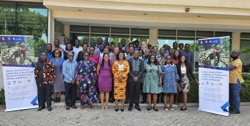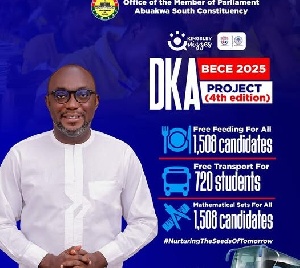Business News of Friday, 11 April 2025
Source: www.ghanawebbers.com
IUCN hosts a 2-day high-level capacity building session

Opening statements from various speakers highlighted the importance of Nature-based Solutions (NbS) in Ghana. Representatives from IUCN, the Ministry of Environment, Science and Technology (MEST), WUSC, the Canadian High Commission, and the Forestry Commission emphasized NbS's role in tackling climate change. They noted that climate change affects biodiversity, smallholder farmers, water access, and forests.
The speakers agreed on the need to integrate NbS into Ghana’s national development plans. They stressed government leadership and multi-sector collaboration as essential for advancing NbS initiatives across Ghana and West Africa. Dr. Peter Dery from MEST stated that incorporating NbS is necessary to address environmental challenges.
The engagement included two sessions. The first session trained 56 industry experts and policymakers on the NbS concept. Participants received practical guidance on using a Self-Assessment Tool (SAT) to evaluate case studies as true nature-based solutions.
This sub-session also allowed stakeholders to share knowledge and experiences with NbS. The second session focused on policy engagement, where stakeholders refined a draft policy brief for mainstreaming NbS in various sectors in Ghana.
Discussions identified ways to integrate NbS into existing policies like the Riparian Buffer Zone Policy. It was important to ensure women's participation in managing freshwater bodies. In fisheries, gaps in inter-sectoral coordination were noted as areas where NbS could help.
Participants also discussed revisiting the National Water Policy to include NbS for flood management instead of relying solely on temporary sea defenses. There was strong support for promoting green infrastructure as sustainable alternatives.
Overall, this engagement moved Ghana closer to a resilient future through support for mainstreaming NbS. Ms. Patience Akwen Nambo from WUSC praised project partners like IUCN and A Rocha Ghana for their contributions.
She thanked participants for their insights and emphasized continuous improvement of proposed ideas. Ms. Nambo highlighted collective action's importance in mainstreaming NbS, especially regarding women's roles in sustainable development.
IUCN’s Dr. Charles Karangwa and Mrs. Dorcas Owusuaa Agyei co-facilitated the event, reaffirming IUCN’s commitment to conserving nature's integrity worldwide. The successful sessions sparked discussions about next steps.
One potential step is creating a national guideline and action plan for integrating NbS into policies. Another goal is establishing an NbS-specific fund basket to attract donor funding for scaling projects nationwide.
Facilitators view these developments positively for the future of NbS in Ghana, ensuring proposed ideas drive meaningful action towards a greener future.










